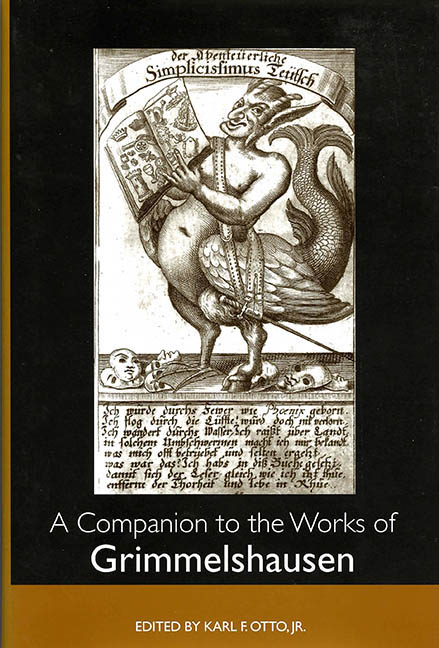Book contents
- Frontmatter
- Contents
- Illustrations
- Acknowledgments
- Chronological List of Grimmelshausen's Works and Their First English Translation
- Introduction
- I Basics
- Problems in the Editions of Grimmelshausen's Works
- Grimmelshausen's “Autobiographies” and the Art of the Novel
- Allegorical and Astrological Forms in the Works of Grimmelshausen with Special Emphasis on the Prophecy Motif
- Grimmelshausen and the Picaresque Novel
- Grimmelshausen's Ewig-währender Calender: A Labyrinth of Knowledge and Reading
- Grimmelshausen's Non-Simplician Novels
- In Grimmelshausen's Tracks: The Literary and Cultural Legacy
- II Critical Approaches
- Notes on the Contributors
- Index
Allegorical and Astrological Forms in the Works of Grimmelshausen with Special Emphasis on the Prophecy Motif
from I - Basics
Published online by Cambridge University Press: 27 April 2017
- Frontmatter
- Contents
- Illustrations
- Acknowledgments
- Chronological List of Grimmelshausen's Works and Their First English Translation
- Introduction
- I Basics
- Problems in the Editions of Grimmelshausen's Works
- Grimmelshausen's “Autobiographies” and the Art of the Novel
- Allegorical and Astrological Forms in the Works of Grimmelshausen with Special Emphasis on the Prophecy Motif
- Grimmelshausen and the Picaresque Novel
- Grimmelshausen's Ewig-währender Calender: A Labyrinth of Knowledge and Reading
- Grimmelshausen's Non-Simplician Novels
- In Grimmelshausen's Tracks: The Literary and Cultural Legacy
- II Critical Approaches
- Notes on the Contributors
- Index
Summary
I. Fundamentals
A. Grimmelshausen as Author between the Middle Ages and the Enlightenment
1. Predecessor of the Enlightenment?
Not only in our progressive times does literary and historical research on the seventeenth century edge toward the Enlightenment. This approach gained legitimacy after the rediscovery of the literary Baroque by scholars of German in the 1920s and 1930s. Should we project Leibniz exclusively into the eighteenth century, not only because of his life span (1646–1716)? Was the universal philosopher, who made differential equations known long before Newton, rather not representative of many of his future-oriented contemporaries, including poets?
Johann Jakob Christoff von Grimmelshausen, whose novel Der Abentheurliche Simplicissmus Teutsch can be viewed as seventeenth century German literature's contribution to the world canon, offered himself as a candidate for such a movement toward reorientation. As one of the most important baroque authors, he is highly eligible. Even if his astonishingly vigorous reception proved itself as relatively weak in the eighteenth century, it (= the reception) should encourage this view. Several details seem to advance the argument that Grimmelshausen was at the very least a forerunner of the Enlightenment. Grimmelshausen, as a “Volkspädagoge,” intended to spread “Bildung in populärer Form,” according to Hubert Gersch, whose comments preceded the reforms of 1968. This can be recognized in the
Vorzeichen jener neuen Geistesbewegung […], die ein Dutzend Jahre später von Thomasius eingeleitet wurde. […] Im Hinblick auf diese Bildungsrevolution wird man Grimmelshausens Kommunikationsarbeit als Vorform aufklärerischer Publizistik einschätzen dürfen. (Gersch 1966, 56–57)
The author approaches “dem liberalen Standpunkt […], den die Gesellschaftskritik der Aufklärung beziehen sollte,” in his Simplician calendar stories. He uses a narrative technique “die als die klassische Methode der Aufklärer gilt: das detektivische Erzählverfahren, das eine Illusion zuläßt, um sie dann abzutragen.” Gersch comes to the conclusion that this seventeenth-century author with “seinen Versuchen in einer rationalistischen Weltschicht” has “merklichen Anteil an einer Bewegung, die noch vom Geist des Humanismus getragen ist und sich als Vorspiel der Aufklärung abzeichnet” (Gersch 1966, 60–61). Jan Knopf, writing after 1968, claims that Grimmelshausen emancipated himself from the Middle Ages (162).
- Type
- Chapter
- Information
- A Companion to the Works of Grimmelshausen , pp. 93 - 146Publisher: Boydell & BrewerPrint publication year: 2002



